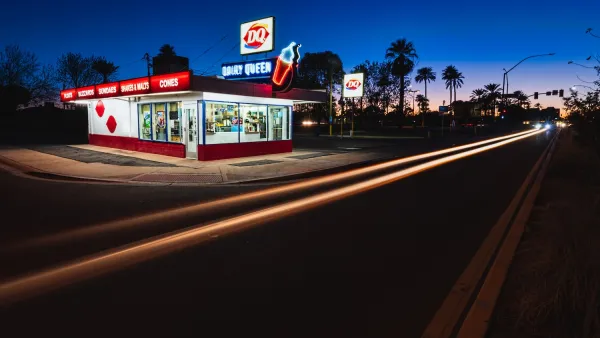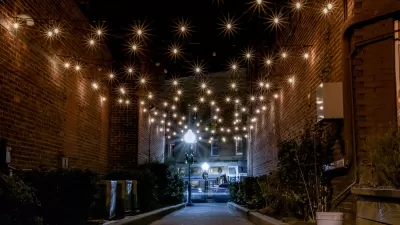Planetizen readers, I have an idea I'd like your opinion on. As managing editor for the past year, I've become increasingly aware of how skilled and professional our readers are. Comments on articles are almost always civil, engaging and thoughtful, something that can't be said for the majority of websites. We have a community of experts here, which is why I bring my idea to you.
Planetizen readers, I have an idea I'd like your opinion on. As managing editor for the past year, I've become increasingly aware of how skilled and professional our readers are. Comments on articles are almost always civil, engaging and thoughtful, something that can't be said for the majority of websites. We have a community of experts here, which is why I bring my idea to you.
The gist is: The Telecommuting Town.
SUMMARY: The promise of the telecommuting future- where workers could work from home, creating a zero commute and allowing people to live where they like- has failed to completely germinate. On the one hand, certain job sectors have moved to a 'gig' economy, where individuals can run small businesses from home and in practice work for a number of employers part-time. On the other, larger businesses have come to distrust the concept of telecommuting as a few bad apples have exploited the practice. The lack of face-to-face contact also poses a challenge, as employers and co-workers miss the direct connection and sense of community that comes from sharing an office.
Meanwhile, a movement is afoot to revitalize Main Streets around the country. Small towns from Waterbury, Connecticut to Baker City, Oregon have worked to restore their main streets through smart growth and economic development strategies. Many of these small towns have the type of well-preserved infrastructure that Smart Growth advocates are promoting. And 30% of people surveyed by the Pew Center indicated that they would like to live in a small town. Lack of access to jobs is the greatest impediment to restoring these small towns.
This project proposes to create a blueprint for the Telecommuting Town, a new community for the future building on the past. Using GIS and demographic surveys, we'll select the Top 20 Towns ripe for creating a telecommuting hub. We'll survey telecommuters around the country to understand their needs. We'll work with economic development experts to explore tax incentives and small business loan programs to attract entrepreneurs and telecommuting workers.
Possible outcomes of the project might be proposals for retrofitting city halls and town centers with wifi, videoconferencing, and meeting rooms to be paid for through small business taxes. Other options might be pairing up with local business owners to create new public spaces that meet the needs of telecommuters and create new customer bases for local cafes, printers, etc. Telecommuting towns might also find that convenient connections to airports or train hubs are important, and create transit shuttles or systems to meet those needs.
So Planetizen readers; what is your expert opinion? Impractical? Missing an element? Voice your opinion below.

Planetizen Federal Action Tracker
A weekly monitor of how Trump’s orders and actions are impacting planners and planning in America.

Congressman Proposes Bill to Rename DC Metro “Trump Train”
The Make Autorail Great Again Act would withhold federal funding to the system until the Washington Metropolitan Area Transit Authority (WMATA), rebrands as the Washington Metropolitan Authority for Greater Access (WMAGA).

The Simple Legislative Tool Transforming Vacant Downtowns
In California, Michigan and Georgia, an easy win is bringing dollars — and delight — back to city centers.

The States Losing Rural Delivery Rooms at an Alarming Pace
In some states, as few as 9% of rural hospitals still deliver babies. As a result, rising pre-term births, no adequate pre-term care and "harrowing" close calls are a growing reality.

The Small South Asian Republic Going all in on EVs
Thanks to one simple policy change less than five years ago, 65% of new cars in this Himalayan country are now electric.

DC Backpedals on Bike Lane Protection, Swaps Barriers for Paint
Citing aesthetic concerns, the city is removing the concrete barriers and flexposts that once separated Arizona Avenue cyclists from motor vehicles.
Urban Design for Planners 1: Software Tools
This six-course series explores essential urban design concepts using open source software and equips planners with the tools they need to participate fully in the urban design process.
Planning for Universal Design
Learn the tools for implementing Universal Design in planning regulations.
Smith Gee Studio
City of Charlotte
City of Camden Redevelopment Agency
City of Astoria
Transportation Research & Education Center (TREC) at Portland State University
US High Speed Rail Association
City of Camden Redevelopment Agency
Municipality of Princeton (NJ)






























